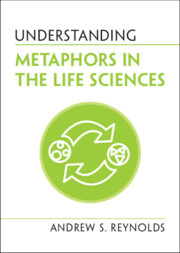Crossref Citations
This Book has been
cited by the following publications. This list is generated based on data provided by Crossref.
Neto, Celso
Meynell, Letitia
and
Jones, Christopher T.
2023.
Scaffolds and scaffolding: an explanatory strategy in evolutionary biology.
Biology & Philosophy,
Vol. 38,
Issue. 2,
Zach, Martin
and
Greslehner, Gregor P.
2023.
Understanding immunity: an alternative framework beyond defense and strength.
Biology & Philosophy,
Vol. 38,
Issue. 1,
Redman, Barbara
2023.
Reconstructing Research Integrity.
p.
19.
Chaly, Vadim A.
2023.
Philosophy and Neurosciences: Perspectives for Interaction.
RUDN Journal of Philosophy,
Vol. 27,
Issue. 4,
p.
835.
Matassi, Giorgio
and
Martinez, Pedro
2023.
The brain-computer analogy—“A special issue”.
Frontiers in Ecology and Evolution,
Vol. 10,
Issue. ,
Robinson, David
2023.
OPT‐ing out: Root−shoot dynamics are caused by local resource capture and biomass allocation, not optimal partitioning.
Plant, Cell & Environment,
Vol. 46,
Issue. 10,
p.
3023.
Matassi, Giorgio
Mishra, Bud
and
Martinez, Pedro
2023.
Editorial: Current thoughts on the brain-computer analogy—All metaphors are wrong, but some are useful.
Frontiers in Ecology and Evolution,
Vol. 11,
Issue. ,
Esposito, Maurizio
and
Baravalle, Lorenzo
2023.
The machine-organism relation revisited.
History and Philosophy of the Life Sciences,
Vol. 45,
Issue. 3,
Kamenshchikova, Alena
Wolffs, Petra F. G.
Hoebe, Christian J. P. A.
Penders, John
and
Horstman, Klasien
2023.
Metaphors of foreign strangers: antimicrobial resistance in biomedical discourses.
Science as Culture,
Vol. 32,
Issue. 2,
p.
294.
Hilliard, Amanda
2023.
Metaphor: The Key to Communicating with Both Specialists and the Public .
Swiatczak, Bartlomiej
2024.
Handbook of the Philosophy of Medicine.
p.
1.
Kara, Abdurrahman
and
Bekiroğlu, İrem
2024.
Kavramsal Metafor İncelemeleri: Türk Dizilerinden Kesitler.
Uluslararası Beşeri Bilimler ve Eğitim Dergisi,
Vol. 10,
Issue. 23,
p.
1.
Liu, Daniel
2024.
The Schema and Organization of the Cell: An Introduction to Ernst Brücke’s Die Elementarorganismen (1861).
Journal of the History of Biology,
Vol. 57,
Issue. 2,
p.
281.
Peters, Winfried S
2024.
Will the real Robert Hooke please stand up?.
The Plant Cell,
Vol. 36,
Issue. 11,
p.
4680.
Lidgard, Scott
and
Kitchen, Emma
2025.
Living Fossil: A Metaphor’s Travels Across Popular Culture and the Foundations of Darwinian Evolution and Anthropology.
Journal of the History of Biology,
Lawrence, Roderick J.
2025.
Paths to
Trans
disciplinarity: Reconnecting Pathways and Positionality
.
World Futures,
p.
1.



